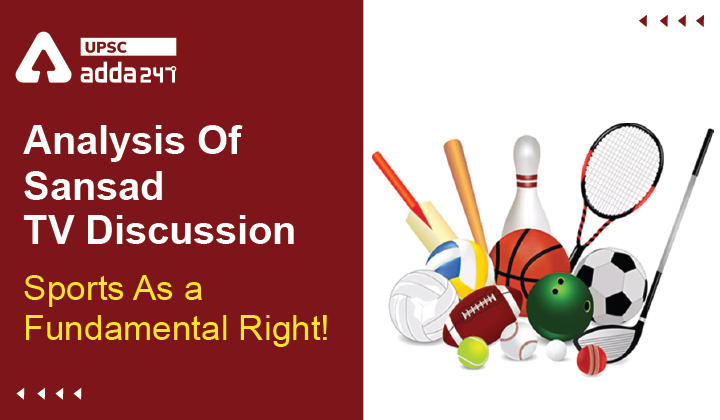Table of Contents
Analysis Of Sansad TV Discussion
”Sports As a Fundamental Right!”
Relevance
”GS 2: Indian Constitution”
Context
- The Supreme Court has recently sought the opinion of the Centre and state governments on a suggestion that physical literacy or sports be recognised as a fundamental right and all education boards be asked to ensure at least 90 minutes of every school day to be dedicated to “free play and games”.
Background
- In August 2018, the Apex court had issued notices to the Centre and state governments on the PIL filed Mr. Kanishka Pandey and had later appointed Sankarnarayanan an amicus to assist it and suggest measures to deal with the issue.
What is the Issue?
- A sports researcher Kanishka Pandey, had submitted a detailed report in front of the SC, through senior advocate Gopal Sankarnarayanan, suggesting that physical literacy be recognised as a fundamental right.
- The report had said that all education boards, including CBSE and ICSE, must be asked to ensure at least 90 minutes of every school day to be dedicated to “free play and games”.
- Earlier in his PIL, Pandey has sought directions to the Centre and all states to make sports a part of the fundamental rights as well as ensure promotion of sports education in the country.
- The amicus has dealt with various aspects relating to constitutional principles and sports, and given a slew of implementable directions.
Key Suggestions
- Physical literacy to be recognised as a fundamental right protected by Article 21 (protection of life and liberty) of the Constitution.
- The Centre can be asked to establish the National Physical Literacy Mission (NLPM) to give effect to the right by establishing and implementing a responsibility matrix that includes curriculum design, compliance monitoring, and review, grievance redressal and self-correction mechanisms, said the report.
- It also sought a direction to ensure that all non-residential colleges and schools shall compulsorily allow access during non-working hours to the neighbourhood children to use their playgrounds and sports facilities for free from the academic year commencing from 2022.
International Charter of Physical Education, Physical Activity and Sport by UNESCO
- The International Charter of Physical Education, Physical Activity and Sport is a rights-based reference that orients and supports policy- and decision-making in sport.
- It promotes inclusive access to sport by all without any form of discrimination. It sets ethical and quality standards for all actors designing, implementing and evaluating sport programmes and policies.
- Adopted at the 20th session of the UNESCO’s General Conference (1978), the original Charter was perceived as innovative at the time – as it was the first rights-based document to state that “the practice of physical education and sport is a fundamental right for all”.
- The revised International Charter of Physical Education, Physical Activity and Sport was adopted during UNESCO’s 38th session of the General Conference (November 2015).
- The revised Charter introduces universal principles such as gender equality, non-discrimination and social inclusion in and through sport. It also highlights the benefits of physical activity, the sustainability of sport, the inclusion of persons with disabilities and the protection of children.
NEP 2020 & Sports
- New Education Policy (NEP)-2020 gives special attention to sports-integrated learning for students to adopt fitness as a lifelong attitude.
- Now, sports will be a part of curriculum.
- In a given academic week, there will be a number of hours set aside for sports. Each student would be able to give their preferences, depending on their interests and aptitude.
Way Forward
- The SC should issue direction to constitute a high-level committee of parliamentarians, academicians and sports persons.
- The court may direct the Ministry of Education to form an empowered committee or working group (committee) consisting of senior officers from key line ministries and independent experts.
- The committee should make appropriate suggestions to amend in the Constitution of India to include sports as a Fundamental Right in Part III, especially in Article 21A of the Constitution of India.
Conclusion
Sports should be included in the curriculum from nursery to secondary level and education with sports subject should be imparted to the child from the very beginning of education. Children’s talent and sports aptitude should be tested from the elementary school days itself so that the talent of a child can be improved and developed through training and education.



 TSPSC Group 1 Question Paper 2024, Downl...
TSPSC Group 1 Question Paper 2024, Downl...
 TSPSC Group 1 Answer key 2024 Out, Downl...
TSPSC Group 1 Answer key 2024 Out, Downl...
 UPSC Prelims 2024 Question Paper, Downlo...
UPSC Prelims 2024 Question Paper, Downlo...




